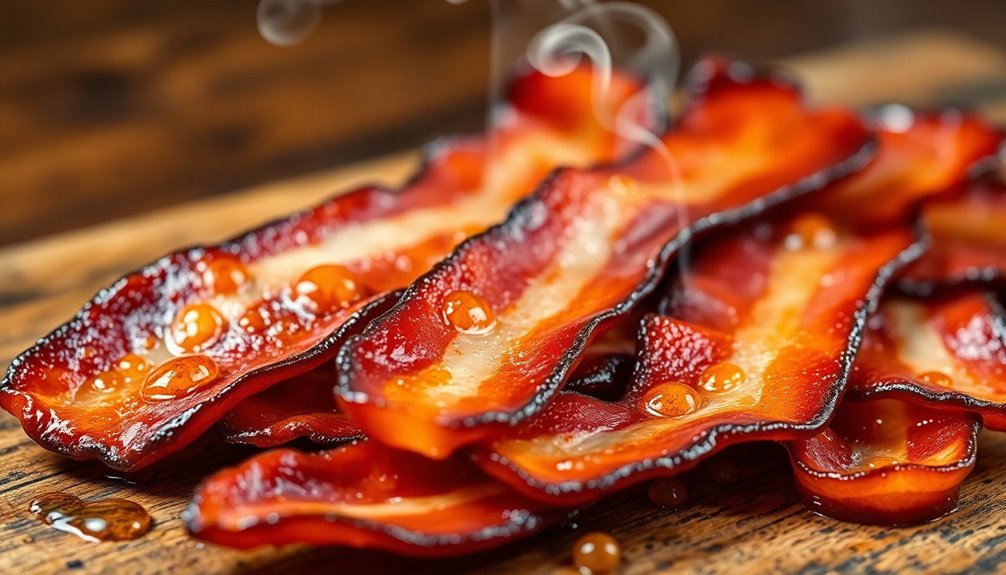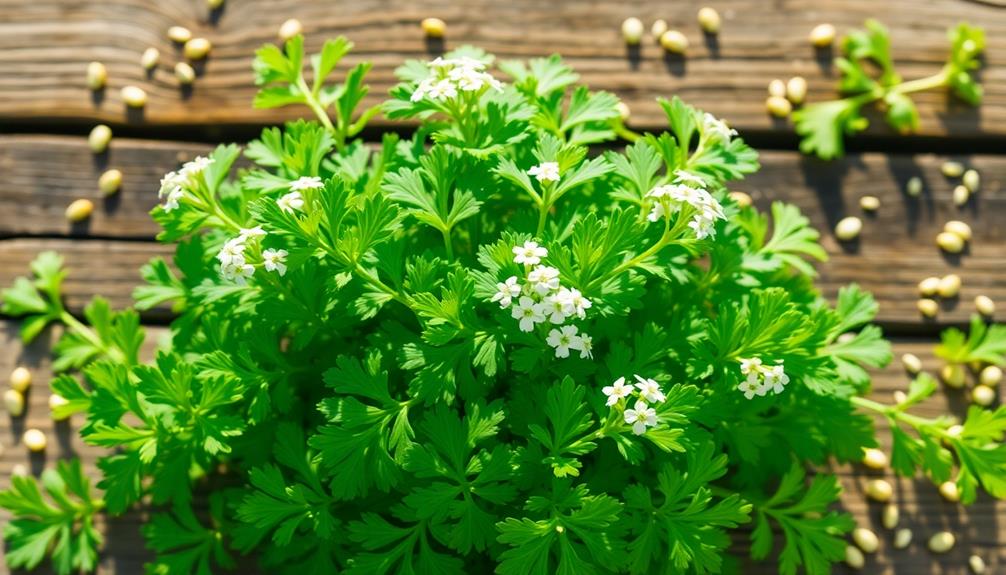Bacon smells absolutely heavenly. When you cook it, the rich, smoky aroma fills the air, awakening your senses and bringing a sense of warmth and comfort. This savory scent often reminds you of cherished family breakfasts or special occasions. Properly stored bacon has a mild smell, but if you detect any sour or off odors, it's a sign that the bacon has spoiled and isn't safe to eat. So, if you're curious about the different bacon varieties and how to enhance its aroma, there's more to explore beyond this delightful scent!
Key Takeaways
- Fresh bacon has a mild, smoky aroma that signifies quality and freshness.
- Cooking bacon emits a rich, savory scent that stimulates the senses and evokes warmth.
- Spoiled bacon gives off sour or sulfuric odors, indicating bacterial growth and potential spoilage.
- Different cooking methods enhance bacon's aroma, with the Maillard reaction contributing to its delightful scent.
- Nostalgic memories of family breakfasts are often triggered by the comforting smell of bacon.
Introduction

Bacon often fills the air with its enticing aroma, making it a beloved staple in many kitchens. When you cook fresh bacon, it typically emits a mild, smoky smell that signals its quality. This appetizing scent can evoke feelings of warmth and comfort, often reminding you of cozy breakfasts or savory dishes.
However, it's crucial to pay attention to the smell of bacon. If you notice any sour or sulfuric odors, it's a clear sign that the bacon might be spoiled, indicating bacterial growth and potential spoilage. Additionally, if you catch a whiff of ammonia, it could stem from the meat being sourced from non-castrated male pigs, known as boar taint, which most people find undesirable.
Being able to identify the scent of bacon is essential for ensuring your meal is safe to eat. Any rancid or off-putting smells mean you should discard it immediately. So next time you're in the kitchen, relish the delightful aroma of fresh bacon, but stay vigilant for any signs that might compromise its quality. Enjoy the experience, but always prioritize your health!
Description of the Smell
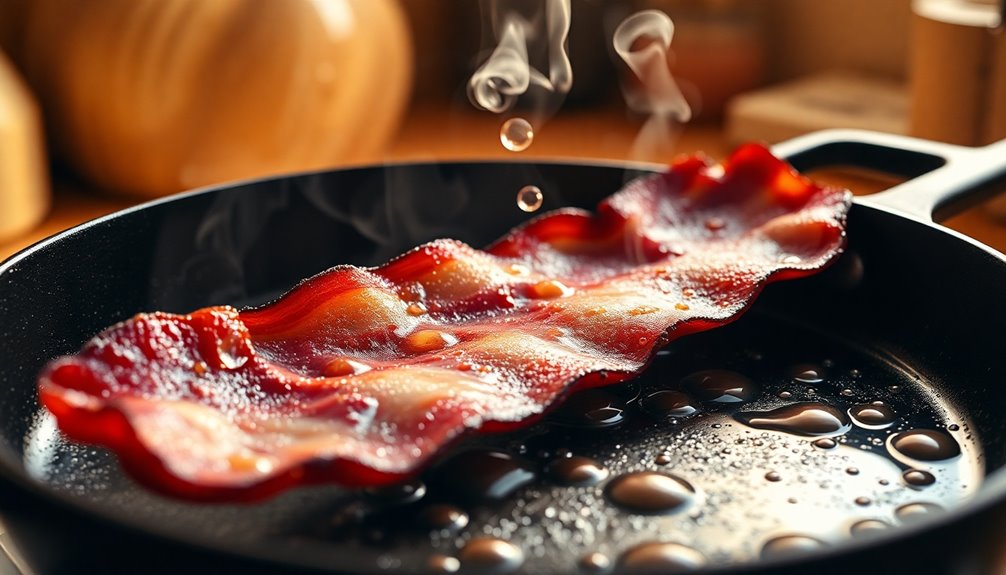
Savoring the aroma of cooking bacon can instantly awaken your senses, filling the kitchen with a rich, smoky scent that's both savory and comforting. As the bacon crisps, the air becomes infused with an intense, mouthwatering fragrance that can make your stomach growl. This delightful smell is a hallmark of quality bacon, inviting you to indulge in its deliciousness.
However, not all bacon scents are appealing. If you catch a whiff of a sour smell or something sulfuric, it's a clear sign that the bacon has spoiled. These off-putting odors indicate bacterial growth, making the bacon unsafe to eat.
You should also be aware that bacon from non-castrated male pigs can produce an ammonia-like odor known as boar taint, which can be unpleasant and deter many consumers. Ideally, properly stored bacon should have a neutral scent, free from any unwanted aromas. If you notice any off-putting odors, it's best to discard the bacon to ensure your health and enjoyment. Enjoy the enticing aroma while it lasts, but trust your nose when assessing its freshness!
Source and Composition

The delightful aroma you enjoy when bacon cooks comes from a combination of its source and composition. It primarily stems from the Maillard reaction, where sugars and amino acids in the meat react to heat, creating an array of aromatic compounds that tantalize your senses. Fresh bacon has a mild, smoky smell, thanks to the curing process, which often incorporates smoke or smoke flavoring.
The fats in bacon play a crucial role in developing its savory scent. When heated, these fats release flavorful compounds that enhance the overall aroma. Different cooking methods, such as frying or baking, intensify the smell of bacon, making it even more appetizing.
However, it's important to be aware of the smell's nuances. If you detect a sour or ammonia-like odor, it may indicate spoilage, signaling that the bacon has gone bad and isn't safe to eat. So, while the rich, savory scent of bacon cooking can be mouthwatering, always trust your nose to ensure you're enjoying fresh, delicious bacon.
Typical Scenarios or Environments

Cooking up bacon often transforms a kitchen into a haven of warmth and comfort. The moment you place those strips in the pan, the rich, smoky aroma fills the air, creating a savory atmosphere that's hard to resist. This smell is synonymous with breakfast environments, inviting everyone to gather around and enjoy the delicious meal that's about to unfold.
You can almost taste the anticipation as the bacon sizzles, releasing its comforting scent. Different types of bacon, like applewood smoked or maple-flavored varieties, add unique notes to the experience, enhancing the allure even further. However, be cautious—if you overcook the bacon, a burnt odor might take over, signaling that it has gone past its prime.
On the other hand, if you catch a whiff of sour or sulfuric smells from uncooked bacon, it's a sure sign that it's nearing spoilage. Paying attention to these scents helps ensure your bacon is fresh and cooked to perfection. In any case, the smell of cooked bacon creates a scenario that draws people in, making it a beloved culinary experience.
Emotional or Cultural Associations
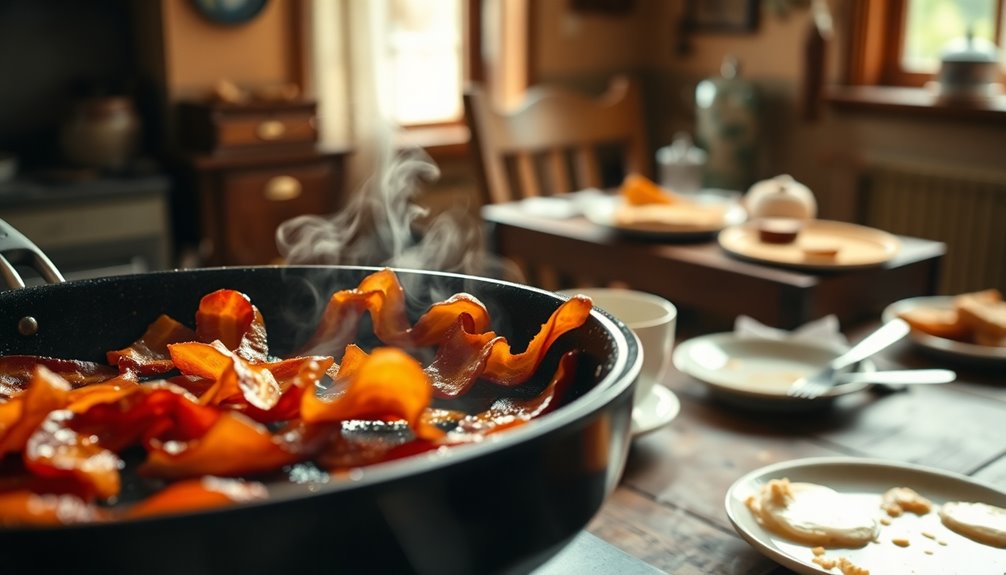
Many people associate the smell of bacon with warmth and comfort, evoking cherished memories of family breakfasts and holiday gatherings. When you catch a whiff of bacon sizzling, it often stirs up feelings of nostalgia and happiness. This savory, smoky aroma not only enhances your mood but also stimulates your appetite, thanks to insights from food science. It's no wonder that bacon has become a staple in comfort foods around the world.
In many cultures, the smell of cooking bacon symbolizes indulgence, representing the enjoyment of rich flavors that bring people together. You might find bacon in your fridge, ready to transform a simple meal into something special. Its enticing aroma is frequently celebrated in media, reinforcing bacon's status as a beloved food item.
The emotional responses you experience are rooted in these cultural connections and personal memories. Each time you smell bacon, it can remind you of those cozy mornings or festive gatherings, making it more than just food—it's a sensory experience that binds you to your past. Whether it's breakfast or brunch, bacon's smell is undeniably comforting and universally cherished.
Health or Safety Considerations

Bacon's comforting aroma can easily overshadow important health and safety considerations. While you might be enticed by the savory scent, it's essential to be cautious. Fresh bacon typically has a mild smoky scent, indicating quality and safe storage. However, if you detect a sour or sulfuric smell, it's a clear sign that the bacon has spoiled and should not be consumed. Spoiled bacon can emit a rancid odor due to harmful bacteria, which poses a significant risk for food poisoning.
Even cooked bacon can go bad, producing a strong, unpleasant smell that signals it's no longer safe to eat. To enjoy bacon without health risks, proper storage is crucial. Make sure to seal it correctly and keep it refrigerated to prevent spoilage odors from developing.
Always trust your nose—if something smells off, it's best to err on the side of caution. Remember, bacon is bad for your health if it's spoiled or improperly handled. Prioritize safety to savor the deliciousness without compromising your well-being.
Final Thoughts
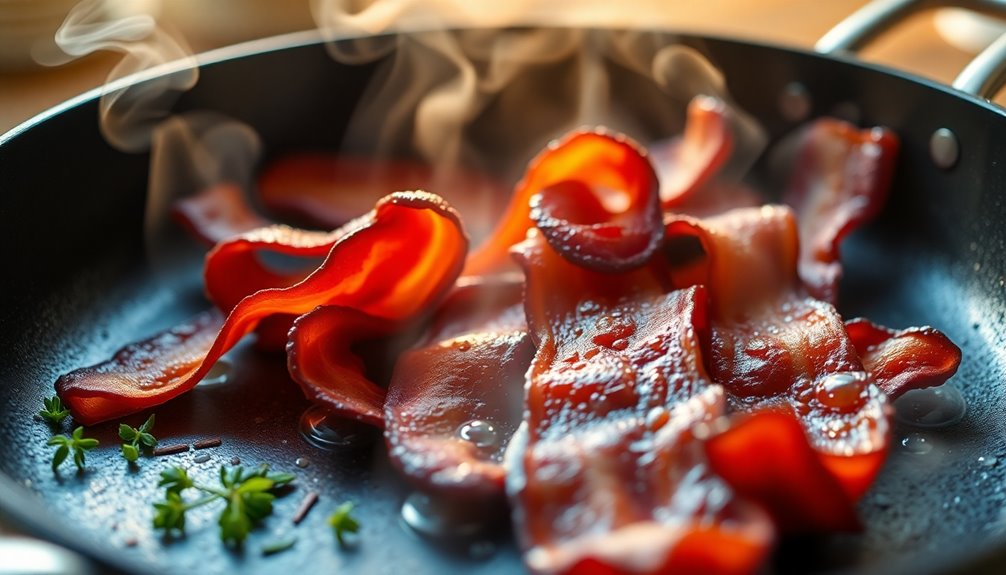
Ultimately, understanding the aroma of bacon is key to enjoying it safely. Fresh bacon typically offers a mild, smoky aroma that's inviting and indicative of its quality. However, if you notice that your bacon feels slimy or emits a strong, sour smell, it's crucial to recognize these as signs of spoilage. The spoiling process involves bacterial growth that can make you sick, so don't take any chances.
When cooking bacon, the savory scent wafts through your kitchen, enhancing the overall experience and often triggering cravings. This delightful aroma is a stark contrast to the unpleasant odors associated with spoiled bacon, which may even have hints of ammonia or sulfur, particularly if it's from non-castrated male pigs. Understanding these differences helps you gauge freshness and safety.
Always trust your senses; if the smell is off, it's best to err on the side of caution. By recognizing what fresh bacon should smell like, you can enjoy this beloved food without worry. In the end, the right aroma adds to the joy of cooking and eating bacon, making it an experience you'll always look forward to.
Frequently Asked Questions
What Is the Smell of Bacon?
When you think about the smell of bacon, you probably imagine a delicious, smoky aroma wafting through the air. Freshly cooked bacon has a savory richness that makes your mouth water and evokes cravings. However, if bacon smells sour or sulfuric, it's a clear sign it's spoiled. The scent can vary based on how it's prepared, but you'll always recognize that enticing fragrance when it's sizzling in the pan. Enjoy responsibly!
What Is the Aroma of Bacon?
When you think about the aroma of bacon, you can't help but picture that rich, savory scent wafting through your kitchen. It's a delightful blend of smokiness and indulgence that instantly makes your mouth water. Depending on how you cook it, the smell can intensify, especially when pan-fried. That captivating fragrance often takes you back to comforting moments, stirring cravings and drawing you closer to that delicious breakfast treat.
How Can You Tell if Bacon Is Spoiled?
To tell if bacon's spoiled, start by checking its color; it should be pinkish-red, not gray, green, or brown. Feel for a slimy texture, which indicates bacterial growth—if it's slimy, toss it out. Look for any visible mold; if you see it, throw the whole package away. Always check the expiration date and ensure you're storing bacon properly to prevent spoilage and keep it fresh.
Why Does My Bacon Smell Funky?
If your bacon smells funky, it could be a sign that it's spoiled. You might notice sour or sulfuric odors, indicating harmful bacteria. Sometimes, ammonia smells come from boar taint in non-castrated male pigs. Fresh bacon should have a mild smoky scent, so any strong or rancid odors mean it's best to toss it. Always check for discoloration or a slimy texture, as these are clear indicators that it's no longer safe to eat.
